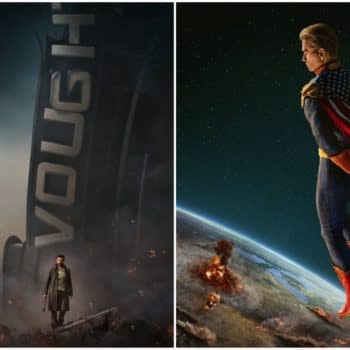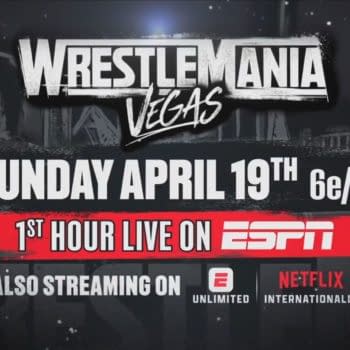Posted in: HBO, Max, Opinion, streaming, TV, TV | Tagged: amptp, Bill Maher, SAG-AFTRA, wga, writers' strike
Bill Maher: WGA Wants "Kooky" Things ("Real Time" Writers, Take Note)
Bill Maher isn't exactly throwing his support behind his "Real Time" writers, saying the WGA is "asking for a lot of things" that are "kooky."
Seriously? The dude threw a pissy fit over Barbie because he believes that things have gotten better for women by trotting out arguments that were so easy to shred that even I could do it. Did you really think Bill Maher wouldn't have a really bad take when it comes to the ongoing SAG-AFTRA and WGA strikes, too? And while we may have already overplayed our hand, we're going to drop in a "QUIZ TIME!" just for the s**ts & giggles. Who do you think Maher saved his more condescending comments for? The AMPTP… which represents Warner Bros. Discovery… which owns HBO… which has Maher under what we're assuming is a pretty sweet contract through 2024? Or the writers? Spoiler? That first writers' meeting back is going to be really awkward…
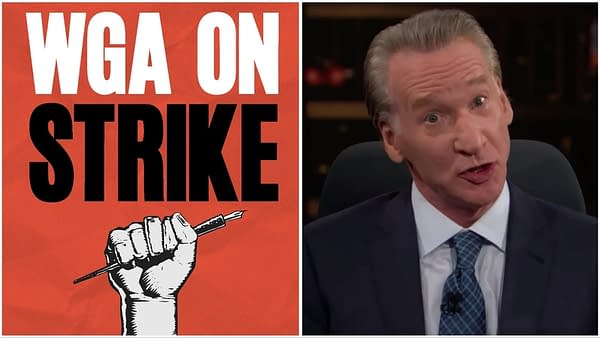
With actor/comedian Jim Gaffigan checking in for this week's episode of Maher's Club Random podcast, Maher has some choice cuts to lob into the conversation – coming from a perspective so front-of-Snowpiercer that you would swear he was playing a character. "They're asking for a lot of things that are, like, kooky," Maher claimed – and at that moment? You know, when "kooky" came out of his mouth? I couldn't help but laugh because that was the response of someone who's been relying on his social circle for intel and not on what's actually been posted. But just in case any of you know Maher? Have him check out what we shared below – and let him know that I would be more than happy to interview him about the list of "kooky" things he was able to pull together.
"What I find objectionable about the philosophy of the strike [is] it seems to be, they have really morphed a long way from the 2007 strike where they kind of believe that you're owed a living as a writer, and you're not," was another adorable hairball that Maher coughed up – and hopefully a red flag for his writers. Because what this dude is saying is that if you're a writer in 2023 then you should still expect to have to work three jobs – even if you write for a mega-popular series that goes on to reap millions upon millions for the streamers. The same dude who claims he's being "canceled" all of the time even as he continues stockpiling new contracts, comedy specials, and live gigs. In large part because of the hard work that the writers on Real Time put in – the same hard work that Maher benefits from adopting even as he adopts a "Let them eat cake!" attitude towards the very same writers he claims to "feel for"… "love"… and is "one of."
In fact, a little life lesson – free of charge? Anytime anyone starts out something by telling you how much they feel for you, love you, and are one of you? It's usually they can't, they don't, and they aren't. It also – nearly 99.98476% of the time – will be followed by a "But…" that waste no time wiping away any fake "goodwill" that was attempted. "I feel for my writers. I love my writers. I'm one of my writers [Ed. Note: Uh-oh…]. But [Ed. Note: Didn't we just tell you…?] there's a big other side to it. And a lot of people are being hurt besides them — a lot of people who don't make as much money as them in this bipartisan world we have where you're just in one camp or the other, there's no in-between," Maher added. Holding the writers – and not the streaming services, studios & media companies who wasted millions upon millions over the past few years trying to be like Netflix and failing miserably – responsible for being out of work is everything you need to know about "McRebel" Maher. Blames the oppressed – not the oppressor. I'm sure that position will serve him well during the next contract negotiation he has with HBO.
So What's So "Kooky" About What The WGA Wants, Bill Maher?
According to a message from WGA Negotiating Committee members Ellen Stutzman, David Goodman & Chris Keyser from late in August, they "were met with a lecture about how good their single and only counteroffer was" – referring to the "comprehensive package" that the AMPTP said it offered the union (which you can check out here). "But this wasn't a meeting to make a deal. This was a meeting to get us to cave, which is why, not 20 minutes after we left the meeting, the AMPTP released its summary of their proposals." The committee members added, "This was the companies' plan from the beginning – not to bargain, but to jam us. It is their only strategy – to bet that we will turn on each other." Following that, the WGA shared a detailed update on what went down during their meeting – and how the AMPTP's offer was "neither nothing, nor nearly enough," while detailing the areas that both sides are still far apart on.
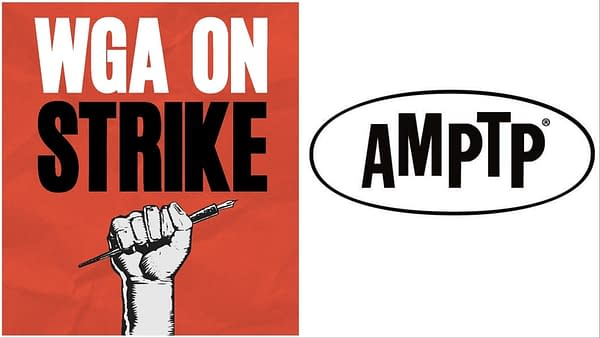
Dear Members,
As promised, here's a more detailed explanation of where we are in the negotiations:
On Friday, August 11th after 102 days on strike, the AMPTP gave us the counteroffer they publicized Tuesday night, August 22nd. The Guild responded with our own counterproposal on August 15th, and there were discussions about a few issues on Wednesday and Thursday last week. On Friday August 18th late afternoon, Carol brought us in for a session that lasted under ten minutes and consisted of the companies making two minor moves on TV issues.
On Monday, the call came to meet with Carol and four of the CEOs on Tuesday night, August 22nd with an indication the companies were finally ready to get serious about bargaining for a deal.
As we reported, the basic message of that meeting was that the companies' first and only counteroffer to the WGA since the start of the strike, made 11 days before, was and had to be the basis for the only deal they were willing to make.
During the meeting with the CEOs, we spent two hours explaining that, though progress had been made, the language of the AMPTP's offer was, as is typical of that body, a version of giving with one hand and taking back with the other.
We repeated what we have said since day one, that our demands come directly from the membership itself. They address the existential threats to the profession of writing and to our individual careers, all caused by changes to the business model implemented by the companies in the last seven to ten years. We stressed that we could not and would not pick and choose among those threats; that we have not struck for nearly four months to half-save ourselves, nor are we leaving any sector of this Guild unprotected when we return to work. We are willing to negotiate within these areas, but every existential issue must be met with a genuine solution.
At the end of the meeting, the companies told us they intended to go directly to our membership by releasing information on their August 11th proposal to the media "within the next 24 hours." They released a six-page document 20 minutes after the meeting concluded.
This should be seen as what it is: simply a tactic in the middle of an ongoing negotiation.
We aren't going to negotiate by press release, so won't go through the AMPTP's characterization of its August 11th proposal in detail, but here are some broad strokes that may already be apparent:
Many of the current deal points they have put forward—minimums, SVOD residuals, AVOD terms—are from a deal negotiated with the DGA more than 80 days ago.
Member power—the strike—forced the companies to negotiate on more issues than they were willing to as of May 1, but still in the typical AMPTP mode of seeming to give while limiting the actual gains. Here are a few examples of areas they've made proposals that are not yet good enough:
- In screen, they have proposed a second step but only for a statistically tiny category of screenwriters, excluding all but the first writers of original screenplays. They dismissed the concept of weekly pay.
- They have ceded selected—but insufficient—minimum terms for some—but not all-Appendix A writers in SVOD. For example, they would not cover anything but comedy-variety.
- In television, the companies have introduced the notion of an MBA guarantee of minimum staff size and duration. But the loopholes, limitations, and omissions in their modest proposal, too numerous to single out, make them effectively toothless.
Teams of two writers would receive P&H contributions as individuals. But not teams of three or more. - We have had real discussions and seen movement on their part regarding AI protections. But we are not yet where we need to be. As one example, they continue to refuse to regulate the use of our work to train AI to write new content for a motion picture.
- Finally, the companies say they have made a major concession by offering to allow six WGA staff to study limited streaming viewership data for the next three years, so we can return in 2026 to ask once again for a viewership-based residual. In the meantime, no writer can be told by the WGA about how well their project is doing, much less receive a residual based on that data.
The counteroffer is neither nothing, nor nearly enough. We will continue to advocate for proposals that fully address our issues rather than accept half measures like those mentioned above and other proposals not listed here.
One last reminder illustrates why the AMPTP's current stance is irrational. As we have repeated from the first day of our first member meeting—and on every day of this strike–our demands are fair and reasonable, and the companies can afford them. Here is the cost to each company of our current asks on the table, including the addition of increased health funding to address the impact of the strike.
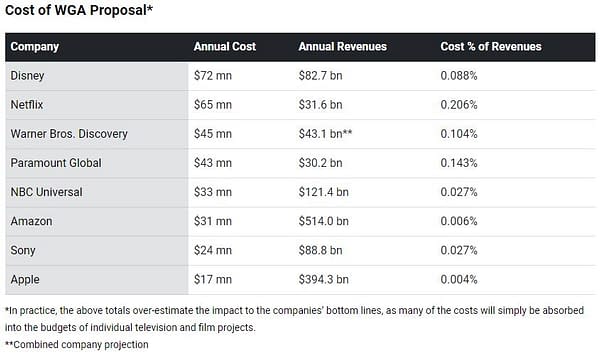
Weigh this against the cost of not making a deal: the cost to 11,500 writers; to actors, crews and drivers; to anyone who works in and around the business but is not on strike; to the economies of California and New York and everywhere film and television is made; to consumers, pension plans and other shareholders; and to the companies themselves. It makes no sense. And everybody but the AMPTP knows it.
In the last 36 hours the response from the membership is that you are undeterred by this latest tactic. Despite the AMPTP's attempt at a detour around us, we remain committed to direct negotiations with the companies. That's actually how a deal gets made and the strike ends. That will be good for the rest of the industry and the companies as well.
Until then, we will see you on the picket lines.
In solidarity.
WGA Negotiating Committee







